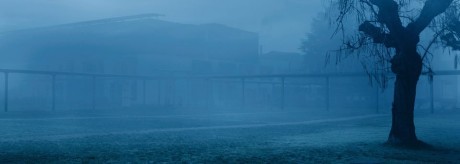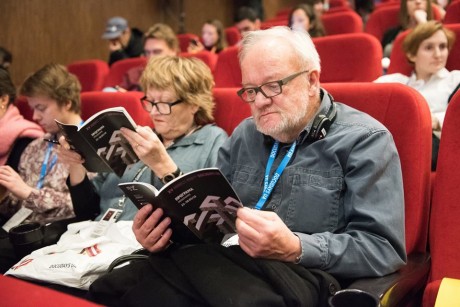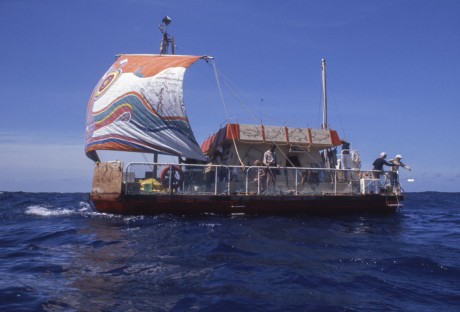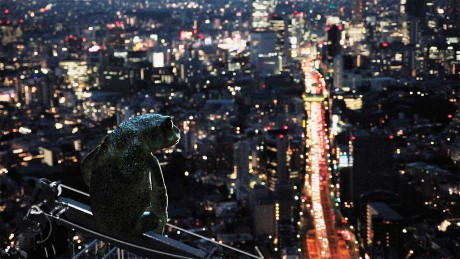The winner of Dox:Award 2018 is ‘The Raft’ ( PHOTO) by the Swedish director Marcus Lindeen, which tells the story of one of the strangest social experiments of all times – told by those who took part in it.
The jury states:
“The winner of the DOX:AWARD 2018 is a film about an endless curiosity for the world and the characters who try to survive in it. Its great accomplishment lies in the equal measure of conceptual and emotional elements in the construction, in which feelings and emotions get literally elevated. Two very different forms are intertwined and merge surprisingly well: we see love, companionship and stamina triumph over darker sides of human behavior. We applaud the director for his stamina to continue working on this extensive and complex project until it reached a form where it looks deceptively effortless to the innocent eye. This jury is not innocent but we were nevertheless captivated and very moved by this film.
The jury perceives the film as a unique record of time and
culture, of aging and ultimately, a monument to the courage of people formerly known as the weaker sex, who embark on a journey into the unknown.
We cannot imagine a better metaphor for what it is we’re all trying to do everyday in the documentary field. We’re proud to announce a film that oozes CPH:DOX from all its pores, in its perfect marriage of form and content, of humanity and aesthetics: we’re delighted to announce as the winner of the DOX:AWARD 2018: The Raft, by Marcus Lindeen.”
The winner of the F:ACT Award is ‘Laila at the Bridge’ by Elizabeth Mirzaei and Gulistan Mirzaei. A powerful film about a woman who is willpower in its purest form.
The jury states:
“In a time where the media leaves societal issues behind after long ages of war documenting the repercussion of conflict this film stands out for its vivid realism, unflinching focus on the fraught reality of a very human story. A story that ultimately we are all collectively responsible for.
In Kabul, full of scars and disappointment, we meet a true hero who tries to catch the faded hope in the eyes of thousands of opium addicts living under a bridge. They rather take drugs than eat bread and the price is almost the same, but the consequences unbearable. But Layla Haidary has a mission and she fights every day to save lives without any support from a corrupt government. Breaking rules and social norms of a woman’s place in Afghanistan, Laila remains resilient and brave.
Meanwhile, the two directors remain persistent and engaged, carrying the flow of the film with honesty and agility, turning their investigation into an ethical mission despite the danger and risks they undertake to fulfill it. Juxtaposing their hero with a horrid environment and a countless number of people and issues aiming at portraying her as a true archetype, entangled in the world’s tragedy but never shying away from her near constant hope to change her world and the world. The award goes to: ‘Laila at the Bridge’ by Elizabeth Mirzaei and Gulistan Mirzaei.”
The winner of the New:Vision Award is the film ‘Wild Relatives’ by Jumana Manna.
The jury states:
“In a diverse selection of New:Vision-ary works in which Nature is understood both as Presence and the Present that defines us, the New:Vision jury has selected an ambitious work of non-fiction that draws a multi-dimensional Venn Diagram in which disparate geographies, contemporary geo-politics and Agro-Feminism intersects in the form of a cinematic seed pod. For its optimism, empathy, and agility in engaging with the present, the New:Vision Award goes to Wild Relatives.”
The winner of the Nordic:Dox Award is the film ‘Lykkelænder’ by the Danish director Lasse Lau.
The jury states:
“The Award goes to a film that challenges in both perception of those portrayed and through its form of representation. The winning film reflects upon historical imbalance with charm and playful questioning of those relationships in the present. This new voice presents a polyphonic cinematic topography that travels beyond borders. The Nordic:Dox Award goes to Lykkelænder.”
The winner of the Next:Wave Award is the film ‘Beautiful Things’ by the Italian directors Giorgio Ferrero & Federico Biasin.
The jury states:
“The award goes to an original film that marries boldness, style, meaning, precision and surprise: Beautiful Things by Giorgio Ferrero & Federico Biasin.”
The winner of the Politiken Audience Award is ‘False Confessions’ by the director Katrine Philp, a legal thriller about a pro-bono idealist’s work for justice in a cynical justice system.
https://cphdox.dk/








